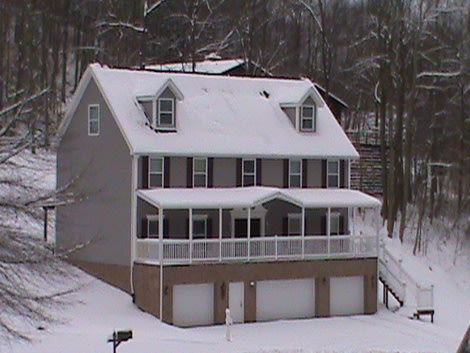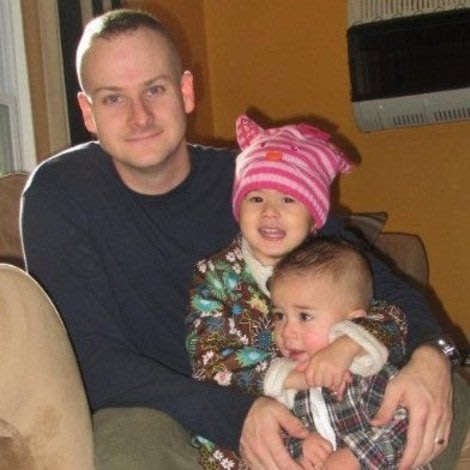By Adam Hatter

I am not a financial genius by any means. At times in my life, I've maxed out all available credit and found myself in debt up to my eyes. But as of June 7, 2013, my wife and I are mortgage-free. That's four years and 10 months from the day we made our first payment.
Why we're paying off our mortgage
Shortly after being married in 2006, my wife and I had a new home built less than 10 minutes away from our jobs. We moved into our home in July 2008 and had our first payment due the following month. Our initial mortgage was in the amount of $156,780 on a 30-year fixed-rate loan at 5.875 percent, which gave us a monthly payment of $927 (before insurance and taxes). This meant at the completion of our 30 years of dedicated payments we would have paid $333,868 (give or take) -- and $177,078 of that would go to the lender, just for having let us borrow money.
Initially we had no intentions of living in our home for more than a few years, so we only made the minimum monthly payments during the first year. The goal was to finish our attic and basement, build a deck, and then sell the home and downsize. But after the birth of our first child and deciding to have a second, we realized the house did meet our needs and we wanted to raise our children there. Once we decided to remain in the house, we knew the sooner it was paid for the sooner we would be free from the shackles of debt; the sooner we would have the ability to use our money for more than just monthly bills.
We devised a plan to pay off the mortgage and "suffer" for a few years while our children were young. We figured while they were babies and toddlers we wouldn't want to have many adventures away from home (Disney with a 1- and 3-year old, no thanks) and they wouldn't require many high-dollar necessities (play dough and crayons provide nearly endless entertainment early on).
How we did it

We pooled resources. This meant taking every penny made and concentrating that beam of liquidity in the direction of our mortgage debt. Our household income is quite average, but when we closely examined our finances, we found that we had much more than we were putting forth to pay toward our mortgage. I'm an analyst for a day job and of course I deal with numbers a great deal, so I created my own budget sheets and amortization charts. In the end, there were several contributing factors that helped us pay off our mortgage in less than five years:
-
We made bi-weekly payments and ensured the extra payment each month went directly to principal. Once the bank started receiving an extra full payment every two weeks they immediately started applying it to our account as a future payment; we learned this lesson quickly and after that made sure the bank coded our account to only apply one payment a month and put everything else toward principal . -
We refinanced. After 26 months of payments on our original mortgage, we had only whittled it down to a little over $147,000. In November 2010 we refinanced this amount to an interest rate of 4.375, staying with a 30-year fixed mortgage. Our new payment was $737 (before insurance and taxes). - We lived well within our means. Goodwill saw the majority of our business.
- Anytime we had extra money we applied it to the mortgage. This was everything from an unexpected tax refund to finding opportunities for overtime at work.
-
We lowered our savings contributions. Our 401k contributions were originally set at 15 percent, so we cut this down to 5 percent and still received our employer match of 5 percent. We also had monthly allotments going toward 529 college savings accounts for our children; after realizing our pooling efforts would only require these contributions to be discontinued for a few years, we decided to stop them temporarily until the mortgage was paid off . -
We avoided other forms of debt. For example, our two paid-for reliable vehicles meant we didn't have car payments absorbing our income. We decided not to purchase a new car unless one of the current vehicles died. Thankfully, they held on. -
We originally had separate his and hers spending accounts that allowed us each to make minor impulse buys without acquiring the blessing of the other; these were cut out. -
We reevaluated our monthly bills. After a number of phone calls and negotiations I was able to lower our cable, cellphone, and car insurance bills. We eliminated our home land line entirely, and we also had our home security service disconnected. -
The tax man was getting more than his share each paycheck, which meant every year we were getting a substantial tax return. We reconfigured our tax deductions with a goal of never owing but trying to gauge our return as close to zero as possible. This added that much more each payday to our bank account. In the few occasions that we received lumps of tax money back, of course those funds went directly to our mortgage, down to the last penny. -
Lastly, we looked at ways we could shrink our utilities. For electric savings, we installed programmable thermostats and lowered the heat temperature and raised the air-conditioning temperature; in the winter we bought mini oscillating heaters (with safety shutoffs) for each bedroom and turned off the heat from 7 p.m. until 4 p.m. the next day; we closed the vents in any room that was not in use (including the basement, attic, bathrooms, and laundry room); as incandescent light bulbs blew out we replaced them with compact fluorescents. All of these changes decreased our average monthly electric usage by almost 50 percent, from around 1,800 to 2,000 kilowatt-hour to where we are now at approximately 1,000 kwh. We also applied a few water conservation rules as well -- opting to take showers at the free gym facilities available at our places of work, enacting "if it's yellow let it mellow, if it's brown flush it down," washing all dishes by hand, and purchasing energy-efficient front loads -- that dropped our water bill down to an average of only $25 a month, which is as low as it gets in our area.
We had some unexpected items pop up during these years. There were post-Christmas 50-percent-off sales that we couldn't resist. We were affected by the derecho storms in summer 2012. And we did have a few events arise that required us to travel. Even though we cut back so much and were applying a lot of our income toward our mortgage, we still found enough money to spend somewhat freely on food and little luxuries like Dora the Explorer stickers and dinosaur fruit snacks.
Life with no mortgage
What next? We plan to take our 401(k) contributions back up to 15 percent, resume our monthly allocations toward the 529 accounts, and start saving to our discretionary accounts so we can finally begin making a few impulse buys without generating a position paper on how the need outweighs the cost to sway the opinion of the other party (that's in marriage terms). We will most likely keep the remaining savings practices we've adopted and possibly work toward reducing our monthly obligations even further. I have been bitten by the energy conservation bug during this endeavor and have pitched plans to include some solar and thermal additions to our home.
I wish I could say we are going to do something extraordinary -- like an extravagant family vacation -- to celebrate our financial conquest but as for right now we have no plans to do so, since our children are still young enough that they are much happier running through the sprinkler in the yard than riding in a car for 10 hours just to pile in a hotel or stand in line at a theme park. But in a few years, once we have two potty-trained non-nap-taking children, we plan to go all out and take a Disney cruise.










0 comments:
Post a Comment